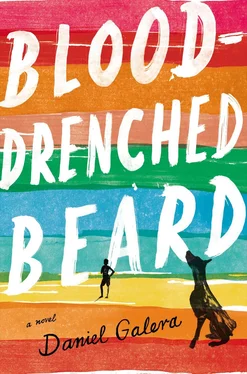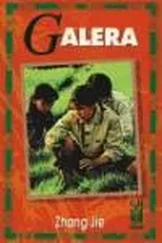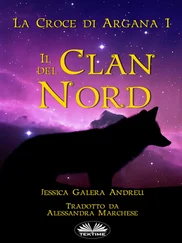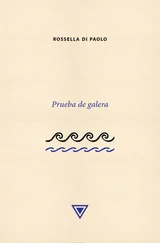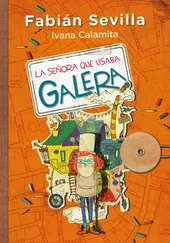He says he doesn’t forgive her, but he understands, and it’s okay. She knows where to find him if she wants, and he hopes she’s very happy. He doesn’t see any reason to tell her that he spent ten days suffering as if his life had lost every possibility of happiness and enchantment, drinking until he blacked out, and running and swimming until his muscles cramped, but that afterward everything went back to normal, and to be honest he doesn’t miss her all that much anymore, and her face vanished from his memory fifteen minutes after he left her sleeping that last morning and will never return unless she sends him a photo, which he’d really like, by the way, and truth be told he has already forgotten her in the other sense too, the sense that would make him suffer now, but he ends up telling her all this anyway, and she falls silent for a few moments and says, See? You didn’t really love me all that much.
• • •
C ecina doesn’t seem surprised by his visit and invites him in without asking why he is there. They exchange the usual pleasantries. The TV in the living room is showing the midday news, and an old man in a vegetative state watches his arrival from a wheelchair next to the sofa, protected from the cold by a wool ski cap and blankets. The smell of fried fish wafts up from the kitchen downstairs.
You’ve never met my husband, have you?
No. What’s his name?
Everyone calls him Quem. His real name is Quirino.
Afternoon, Quirino, he says waving.
The old man’s breathing grows labored.
Please, have a seat. Would you like a coffee?
No thanks, Cecina. I’ll be quick. I just want to ask you something. Do you remember that my mother was here a few weeks ago and you talked to her in front of the apartment?
Yes. Very friendly, your mother.
She thought the same about you.
And how’s the girlfriend?
She’s gone. She went back to Porto Alegre.
For good?
I think so.
Aren’t you going to go after her?
No.
Oh dear.
Cecina, I was swimming with my dog this morning over near Baú Rock, and—
How’s she doing?
She’s great. She still walks a little crooked, but she’s already running around with her tongue out and goes everywhere with me.
She looks like a fish in the water.
She does. And it was precisely as I was taking her for her swim this morning that I looked up at the door to the apartment and remembered that time you stopped to chat with my mother. Something was niggling me, and I couldn’t work out what it was, and then suddenly it came to me. You mentioned my grandfather. Remember?
Did I?
Yes. But I’d never talked about my grandfather to you.
Old Quirino wheezes in his wheelchair.
People are saying that you’ve been asking around about your grandfather. And to be honest, if it were up to a lot of people, you wouldn’t be here anymore. Several people have asked me to turn you out. But you gave me a check for the whole year. It’s become a problem for me.
You said he wasn’t easygoing like me, or something to that effect. Did you know him?
No.
But what do you know about him? I know that he died here, but besides that everyone tells me different things. I had decided to forget about it, but now it’s all come back to me, and this whole story is driving me crazy.
Are you sick? You didn’t have dark circles under your eyes before.
I can’t move on with my life as long as I don’t know, Cecina. Before he died, my dad told me about my grandfather. He wanted to know, and now I want to know. I need to. You have to help me. Of the people who were around back then, you’re my only friend. I’m begging you. Please.
Old Quirino starts gurgling saliva. Cecina is silent. She looks at her invalid husband, gets up, and disappears down the corridor pushing his wheelchair. She comes back several minutes later and sits on the armchair opposite him again.
I knew your grandfather. Everyone knew him during the time he spent here. But few people knew him well. I was a teenager.
Do you know how he died?
Yes, but I can’t tell you.
Why not?
I’m afraid. No one who saw it and is still alive will tell you.
Did you see it?
I did, and I pray every day to forget it.
He rests his forehead in his hand and sighs. Cecina goes to fetch a pen and notepad then sits and starts writing something in her slow handwriting to the sound of a hysterical department store advertisement.
Don’t tell anyone I told you about her, she says, handing him the paper. Say you found out some other way. My husband’s the only one who knows you came here, and he can’t speak.
He looks at the paper. There is the name of a woman, Santina, a cell phone number and a street address in Costa do Macacu.
She didn’t see what happened that day with her own eyes, but she knows everything. She’s the only person who will tell you.
Who is she?
She was your grandfather’s girlfriend.
• • •
T he dirt road follows the edge of Siriú Lagoon, passes through the communities of Areias do Macacu, Macacu proper and Morro do Fortunato and arrives at Costa do Macacu, a huddle of wood and brick houses perched on a partially cleared hill, the slope of which ends at the edge of the lagoon. From the village itself, the hills appear to embrace the lagoon, leaving only a narrow opening through which he can see the creamy sands of Dunas do Siriú, and beyond them the ocean stretches out to the fold of the horizon. Two cows chewing the cud in a small roadside barn look bored with the landscape, and friendly mutts keep an eye from verandas and gates on the traffic of motorbikes and bicycles, protecting their tiny kingdoms. Most of the houses are closed due to the cold, and clusters of children in blue uniforms walk down the middle of the road on their way to school. Beyond the school, there are fewer houses, and the steep little road that leads to Santina’s house appears on his left. After his arduous ride up the long, winding road to the village, he has to push his bike up this last stretch. The door and windows of the light blue cottage are ajar, and he can see several people moving about inside.
He knocks lightly on the door and is greeted in seconds by a young woman with cheeks flushed from the cold, black hair in a ponytail, and a wide scar on her jaw. He says he is looking for Santina, and she gives him a good look up and down while holding her cardigan closed at chest height. He explains that he tried to phone beforehand but no one answered, and it is an urgent matter. He expects to be interrogated and to provide explanations, but the woman opens the door and invites him into a dimly lit dining room with one door leading to a corridor and another to the kitchen, from which wafts a strong smell of chicken soup and cilantro. The table is set for lunch on a pink tablecloth embroidered with flowers, and an old man and two children are still eating. Near the door to the kitchen a small woman of about sixty in a thick brown wool cardigan is kneading bread dough on a smaller table beneath a large framed portrait of Christ. The young woman nods at her, and at the same time the older woman stands, wipes her floury hands on a white tea towel, and speaks in a weak, croaky voice.
Come in, son, come in. Have you had lunch?
I have. Are you Santina? I—
Yes, but visitors aren’t allowed to just stand there looking at food in this house. Aninha, get another plate, please. Do you like chicken soup?
Santina starts to pull out a chair but stops suddenly, takes a step back, and claps her hand to her mouth.
My God, he’s the spitting image of Gaudério.
I’m his grandson.
Who’s Gaudério, Grandma?
No one moves or says a thing. Santina stands there with her hand over her mouth, eyes bulging. Another woman appears at the kitchen door. The old man swallows what’s in his mouth, drops his fork noisily on the plate, and turns to look at him.
Читать дальше
